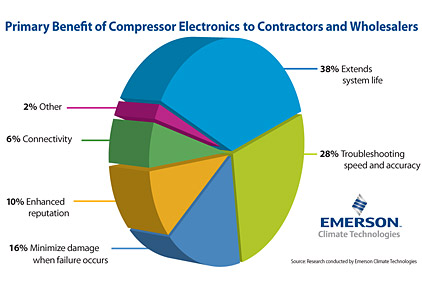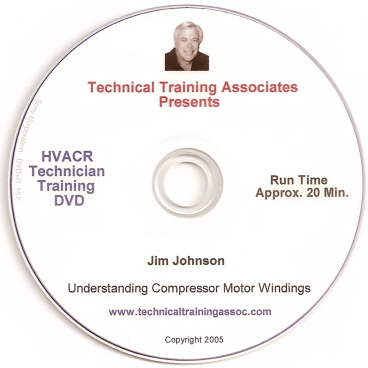 There are multiple benefits of compressor electronics — some are more important to the contractor and wholesaler than others. In a recent survey by Emerson Climate Technologies of contractors and wholesalers to gauge their knowledge of compressor electronics and their perception of the technology, 38 percent saw the extension of system life as the primary benefit. Troubleshooting speed and accuracy was identified as most important by 28 percent of the respondents, while the ability to minimize damage when failure occurs received 16 percent.
There are multiple benefits of compressor electronics — some are more important to the contractor and wholesaler than others. In a recent survey by Emerson Climate Technologies of contractors and wholesalers to gauge their knowledge of compressor electronics and their perception of the technology, 38 percent saw the extension of system life as the primary benefit. Troubleshooting speed and accuracy was identified as most important by 28 percent of the respondents, while the ability to minimize damage when failure occurs received 16 percent.
Some contractors and wholesalers are concerned about how to sell the value of compressor electronics to homeowners, but about a quarter surveyed see no barriers to selling whatsoever.
When service technician Nathan Pence of Lochard Inc. in Sidney, Ohio, arrives at a job site, the first thing he does is look to see if the unit contains a compressor electronics module. It’s an important time-saving step that he says makes a difference in how he approaches the service call. “If the system is not equipped [with compressor electronics], I need to talk to the homeowner more about the issue and if it’s an intermittent issue it is really hard to diagnose. And that is frustrating for the homeowner.”
Pence is among a growing number of contractors who are seeing the benefit of compressor electronics, technology that uses the compressor as a sensor to unlock and interpret information found inside the compressor, providing new levels of diagnostics, protection, and communication.
In today’s economy and competitive landscape, solid, reliable performance is key — for both HVACR systems and service technicians. There is a need in the industry for equipment that can diagnose and protect itself from costly failure until a qualified contractor arrives for service. This smarter equipment helps lower maintenance costs and system downtime, and saves contractors valuable time by enabling faster, more accurate troubleshooting and ultimately reducing callbacks.
Electronics for HVACR systems have been around in control boards for many years, but a number of significant developments in compressor technology have laid the groundwork for a smarter compressor enhanced with compressor electronics.
Inside the System
By sensing, monitoring, and interpreting electrical and mechanical information, compressor electronics allow contractors to monitor the HVACR system on an ongoing basis. The detailed compressor and system information it delivers enables quick and accurate identification of performance issues for greater reliability and cost savings, providing freedom to refocus time and money on other priorities.
Compressor electronics gathers key operating parameters including:
• Current signature of the compressor;
• Compressor operating and protector behavior; and
• Demand, temperature, and operating time.
This information is then interpreted by unique software algorithms that are rooted in many years of compressor testing, teardown, and operating experience. These software algorithms use the information to identify:
• Conditions leading to out of the envelope compressor operation;
• System faults and electrical issues; and
• Escalating patterns leading to catastrophic faults.
Emerson Climate Technologies produces compressor electronics with its CoreSense™ technology for Copeland Scroll™ and Copeland Discus™ compressors. In developing CoreSense compressor technology, Emerson sought to identify pain points throughout the distribution channel and drive technology that would extend system and compressor life, drive down maintenance costs, reduce system failures, and decrease warranty claims.
Key Market Segments
Over the past 10 years, Emerson has been developing a suite of compressor electronics technologies across a number of channels. The company now offers stand-alone modules as part of the OEM and aftermarket channels, onboard controls that are shipped with the compressor, and integrated system controllers that feed information back to in-home devices like thermostats.
When it comes to refrigeration equipment, operators are faced with costly installations, perishable inventory, maintenance costs, narrow profit margins, and overall energy costs. By utilizing systems with compressor electronics, retail operators can be assured of quality installations, system uptime, reduced maintenance costs, and tighter control of energy consumption. Another key benefit of using the compressor as a sensor is the ability to use a system controller for online access to performance data and remote troubleshooting.
Top 10 Potential Benefits
According to a recent Emerson Climate Technologies study, the Top 10 potential benefits from compressor electronics are:
• Improved troubleshooting and reduced callbacks.
• Remote troubleshooting.
• Early detection or warning can prevent compressor failure.
• Minimize product loss.
• Prevent equipment damage.
• Improved uptime.
• Data collection, run time, and fault history.
• Verify refrigerant charge and proper installation.
• Active protection drives a reduction in warranty claim costs.
• Communication to building automation system.
Publication date: 6/03/2013
Want more HVAC industry news and information? Join The NEWS on Facebook, Twitter, and LinkedIn today!










